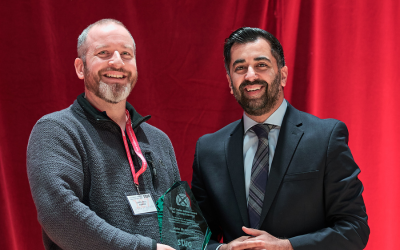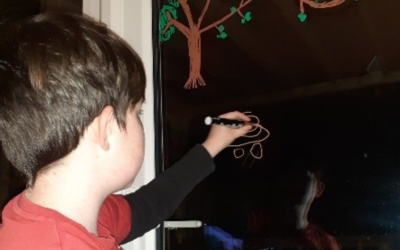Scottish football and climate change
 Author:
Author:
Dr Leslie Mabon is a Lecturer in Environmental Systems at The Open University.
In October 2021 he was a guest on BBC Radio Scotland’s Off the Ball programme to talk about climate change and Scottish football, and his team Raith Rovers.
Leslie is attending COP26, the United Nations Conference of the Parties, in Glasgow as an OU observer.
Going to watch the football, in Scotland at least, is probably going to be a very small part of your environmental footprint.
The world’s leaders aren’t going to gather at COP26 and decide that banning Scottish football is the way to curb the world’s emissions.
However, it’s inevitable that we are going to have to change and adapt in the coming years.
There are things Scottish football can do that will reduce the extent of climate change; and there are things we can do to be better prepared.
Preparing for climate change
As a country, we are used to bad weather. I remember driving from the Black Isle to Kirkcaldy with my dad in the mid-90s for Raith Rovers games, only to find out at Pitlochry that the match was off due to a frozen or waterlogged pitch.
But climate change is likely to lead to more severe and frequent extreme events – rainfall, storms, floods, heatwaves.
So we should be asking now: what time of year should we be playing football in? Can we make better use of data and weather forecasts to make decisions about calling games off further in advance?
 If a game’s called off and a team has come a long way, can we re-schedule it the next day?
If a game’s called off and a team has come a long way, can we re-schedule it the next day?
And then there’s the heat. As we saw with the Olympics in Tokyo this summer, there are potential player welfare issues when it comes to training in heat.
If we’re having more flexible seasons or even (whisper it) summer football, might we need water breaks or to start games earlier or later?
There are also effects on stadiums themselves. There is a multitude of maps and models and simulations out there that give us a sense of how rising seas and rivers affect Scotland.
Might we need flood defences around lower-lying grounds? And how do we keep grass pitches healthy when the conditions are changing?
While 3G pitches do have their benefits a recent study from Norway suggests the rubber pellets can get into water courses and end up being a source of pollution. Plastic pitches also get hotter.
Stopping the worst from happening
When a power cut brought the Fife Derby to an abrupt halt several weeks ago, the Rovers gave the whole of Scotland a timely reminder that a football stadium needs electricity to run.
That electricity has to come from somewhere. This is going to be an even more pointed question next year, when the World Cup is held in Qatar with a fleet of brand-new air-conditioned stadiums.
The more electricity we can get from renewable sources like wind and solar, the better. In Scotland, this is something we’re getting better at.
Wick Academy Football Club are even sponsored by the Beatrice Offshore Wind Farm.
A lot of us go to games in buses or on trains anyway – but there’s still room for improvement.
When I went to see FC Augsburg in Germany, I was amazed to see bike racks outside the stadium, and free trams to and from the city centre on matchdays.
Better coordination and joined-up thinking could get even more of us onto public transport.
So which clubs are doing well?
The Scottish Football Association recently partnered with Zero Waste Scotland to pen a report into Environmental Sustainability in Scottish Football, and have been reaching out to clubs up and down the country to encourage them to think about sustainability and climate change.
Hibernian are striving to be the ‘greenest club in Scotland’ with a campaign focused on energy, food, transport, and education.
Ayr United ran a really good programme of education in schools on climate change through their academy.
Raith Rovers' Community Foundation, meanwhile, got a grant from Nature Scot to turn derelict land outside Stark’s Park into healthy and vibrant green space.
To sum up
Taking climate change seriously doesn’t mean we have to stop going to the football. And I certainly don’t want to preach at folk.
Football and football clubs are however a great channel for sparking discussion and thinking on how climate change might affect other areas of our lives.
The COP26 negotiations end on November 12th. Raith Rovers are away to Hamilton Accies on November 13th.
If any world leaders want to extend their stay in Scotland for a day, I’m inviting them to join me in the away end at New Douglas Park to share ideas on how we can make a fair and effective climate change response happen.
This blog was originally published by Dr Leslie Mabon (longer version).
Find out more about climate change and COP26 on our OpenLearn hub.
News
Media contacts
Media enquiries
OU in Scotland Media Relations:
Call 0131 549 7932
OU UK Press Office:
Call 01908 654316
Out-of-hours:
07901 515 891
Visit our OU UK news site

